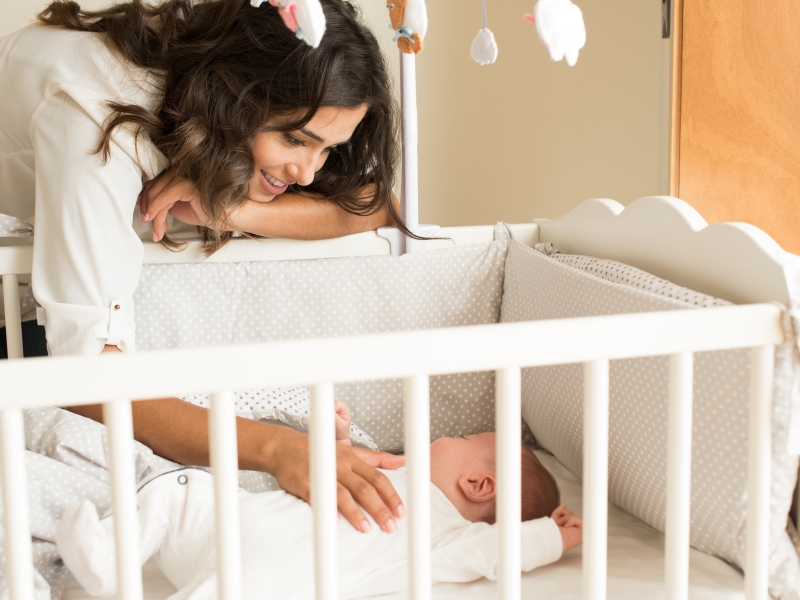Sudden infant death syndrome (SIDS) is the sudden and unexpected death of a baby where no cause is found. The sudden and unexpected death of a baby is usually referred to by professionals as ‘sudden unexpected death in infancy’ (SUDI) or ‘sudden unexpected death in childhood’ (SUDC), if the baby was over 12 months old. The death of a baby which is unexpected is also sometimes referred to as ‘sudden infant death’.
Some sudden and unexpected deaths can be explained by the post-mortem examination, revealing, for example, an unforeseen infection or metabolic disorder. Deaths that remain unexplained after the post-mortem are usually registered as ‘sudden infant death syndrome’ (SIDS) or ‘sudden unexplained death in childhood’ (SUDC) in a child over 12 months. Sometimes other terms such as SUDI, SUDC or ‘unascertained’ may be used.
While SIDS is rare, it can still happen and there are steps you can take to help reduce the risk for your baby.
What causes SIDS?
We do not know what causes SIDS. For many babies it is likely that a combination of factors affect them at a vulnerable stage of their development, which leads them to die suddenly and unexpectedly.
However, we do know you can significantly reduce the chance of SIDS occurring by following safer sleep advice.
What age babies are most at risk of SIDS? When does the risk decrease?
Around 83% of SIDS deaths happen when a baby is six months old or less. The most vulnerable period is under 3 months but it is important to follow safer sleep advice until your baby is 12 months old.
To reduce the risk of SIDS for your baby, follow our evidence-based safer sleep advice –such as sleeping your baby on their back in a clear sleep space – for the first six months.
After this time, the risk is reduced, however SIDS can still happen so it is best to continue the safer sleep routines you have built up over time.
Does SIDS have any symptoms?
There is currently no evidence to suggest that any babies who have died from SIDS had any previous symptoms.
However, researchers around the world are currently engaged in a number of research projects that aim to find the underlying cause of SIDS and any factors that might suggest that a baby is at a higher risk. The conclusions of this research may lead to doctors being able to identify whether a baby is at a higher risk, and they could then work with the parents to decrease the risk for that baby.
Why don’t we use the term ‘cot death’?
‘Cot death’ was a term commonly used in the past to describe the sudden and unexpected death of an infant. It has largely been abandoned, due to its misleading suggestions that sudden infant death can only occur when a baby is asleep in their own cot, which we know to be untrue.
Is SIDS very common?
While SIDS is comparatively rare – 196 babies died of SIDS in the UK in 2019 – it can still happen and there are steps you can take to help reduce the chance of it occurring.
Can SIDS be prevented? What are the biggest risk factors?
While SIDS cannot be completely prevented, you can reduce the risks of it occurring considerably by following our safer sleep advice. For example:
- Sleep your baby on their back for all sleeps – day and night – as this can reduce the risk of SIDS by six times compared to sleeping them on their front.
- Share a room with your baby for the first six months – this can halve the risk of SIDS. The safest place for a baby to sleep is in their own clear, flat, separate sleep space, such as a cot or Moses basket in the same room as you.
- Keep your baby smoke-free during pregnancy and after birth – this is one of the most protective things you can do for your baby. Around 60% of sudden infant deaths could be avoided if no baby was exposed to smoke during pregnancy or around the home.
- Never sleep on a sofa or armchair with your baby as this can increase the risk of SIDS by 50 times.
- Do not co-sleep with your baby if you or anyone in the bed have drunk any alcohol, smoke, been taking drugs or medication that make you drowsy; these factors can put babies at an extremely high risk of SIDS when co-sleeping. One study found that the risk of SIDS when co-sleeping is six times higher in smokers than in non-smokers.
The above is especially important for babies who were born premature or of low birth weight, as these babies are at a higher risk of SIDS.

